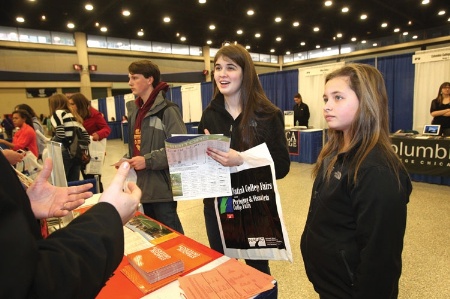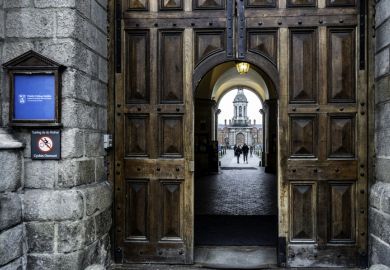Source: Getty
Different rules apply: US institutions are not allowed to pay commissions on the enrolment of home students, but they may do so in the search for international students
If you can’t beat ’em, join ’em. That’s not officially the rationale behind a controversial decision in the US to ease restrictions on paying commissions to student recruiters, or agents, in the increasingly competitive international market. But it might come close.
The assembly of the National Association for College Admission Counseling, or the NACAC, recently voted 152:47 to revise its Statement of Principles of Good Practice and to allow international recruiters to be paid financial incentives for each student they sign up – something US universities are prohibited by law from doing when they enrol domestic students.
The move comes as US institutions try to lure more international students paying full tuition fees as a source of badly needed revenue, and struggle to level the playing field with global rivals.
“The primary concern was that US institutions were at a significant disadvantage in competing for international students,” says Eddie West, the NACAC’s director of international initiatives.
“Certainly when you see examples of Australia and the UK, in many cases, effectively using this agent-based recruitment approach, and because of the financial pressures a lot of schools are facing, they’re saying, ‘Hey, this is an attractive method’.”
West concedes that the debate has been heated.
“It is really an imperfect solution to a lot of folks’ concerns, and there are members who aren’t thrilled with us shifting our position even one iota, and who wish we’d held the line,” West says. “But you had such a chorus of institutions saying, ‘It’s all well and fine to maintain these principles, yet here is what we’re seeing overseas. Here’s how we’re being out-competed.’”
While the US still attracts by far the largest number of international students of any country, its share of the total has dropped from 28 per cent in 2001 to about 19 per cent today, according to the Institute of International Education. And foreign students constitute just under 4 per cent of overall enrolment in the US, compared with 19 per cent in the UK and 26.4 per cent in Australia.
Potential for abuse
But critics say that is not a good enough reason to allow commission-based recruitment, with the attendant potential for abuse.
“The risk is that we will encourage students to come, because of a financial incentive, who may not necessarily be the best match for our schools,” says Marjorie Smith, associate dean of international student admission at the University of Denver.
“When we’ve had a chance to evaluate a decade of experience under this new standard, we’re going to conclude that it wasn’t a good idea.”
Others point out that one in five US universities pay commissions to third-party agents already, and that bringing the practice out into the open will allow for more accountability.
“It’s already going on. It’s a fact of life. Moralising about it is not going to make it go away,” says Stephen Foster, associate vice-president for international affairs at Wright State University and president of the American International Recruitment Council, which was founded five years ago to establish standards, separately from the NACAC, for international recruiting.
Using commission-based agents can help less well-known universities such as his compete around the world at the same level as major US universities with well-funded international admissions offices, Foster argues.
“From a business standpoint, it’s a very good model,” he says. “As in any sort of business arrangement, you have to build in regulations and constraints.
“So, assuming you have those in place, using commission-based agents can be particularly advantageous for institutions that are trying to expand their footprints internationally, and where it might be difficult for them to invest resources.”

Already, 22 per cent of US universities and colleges use agents for at least part of their international recruiting, in spite of previous the NACAC rules, according to a survey by the association.
There have been several reported instances of problems.
One campus of the University of Wisconsin, Stevens Point, which aims to increase its number of Chinese students, stopped paying commissions to a recruiting agency in China after finding that it was falsifying applicants’ credentials to get them in, for example.
A report by the NACAC contended that, even where there is regulation of commission-based recruiting – including in Australia – it still “do[es] not fully mitigate the risk of irresponsibility and student harm”.
And when restrictions that stopped US universities from paying commissions to their own domestic recruiters were briefly eased during the George W. Bush administration, widespread fraud was alleged, mostly at private, for-profit institutions.
The law has since been tightened to ban any university in the US from paying a commission to recruit American students.
That has led to a new dispute among some of the nations embroiled in the scramble for international students: several universities in Canada and other countries, some of which are also affiliates of the NACAC, want the right to pay commissions to agents to recruit students enrolled in US secondary schools. How can it be fine for US universities to pay recruiters abroad, they ask, but not permissible for non-American universities to recruit US students that way?
‘Tricky to navigate’
There has been discussion about allowing any institution in the world to pay commissions to recruiters outside, but not inside, its home country.
But that idea has so far failed to gain traction because the 400 universities outside the US that participate in the US financial-aid system – meaning they accept US government money towards visiting American students’ tuition fees – are, at least for now, prevented by US law from paying commissions to recruit Americans.
“That gets at the heart of what makes these such a tricky set of issues to navigate,” West says.
Two committees of the NACAC have been set up to draft new guidelines for US universities that choose to pay commissions to international recruiters. Their reports are due next autumn.
Among the ideas proposed are: to encourage institutions that opt to use commission-based international recruiters to post on their websites a list of their names, so students are not misled by agents claiming non-existent connections with US universities; and to demand that the agents make the same disclosures, providing full lists of the institutions with which they have formal ties.
There is also a proposal that the universities make public the contractual terms of their agreements with recruiters.
But critics, including Smith, remain sceptical. She says the global movement of students in higher education should not be all about money.
“Having international students on campus has been a benefit to our higher education system for reasons that have always included that they typically pay a higher rate for their tuition than our domestic students do,” Smith adds.
“But in my mind, up until now – and, I hope, [beyond the NACAC’s] decision – it isn’t the first reason.”
Register to continue
Why register?
- Registration is free and only takes a moment
- Once registered, you can read 3 articles a month
- Sign up for our newsletter
Subscribe
Or subscribe for unlimited access to:
- Unlimited access to news, views, insights & reviews
- Digital editions
- Digital access to THE’s university and college rankings analysis
Already registered or a current subscriber? Login





